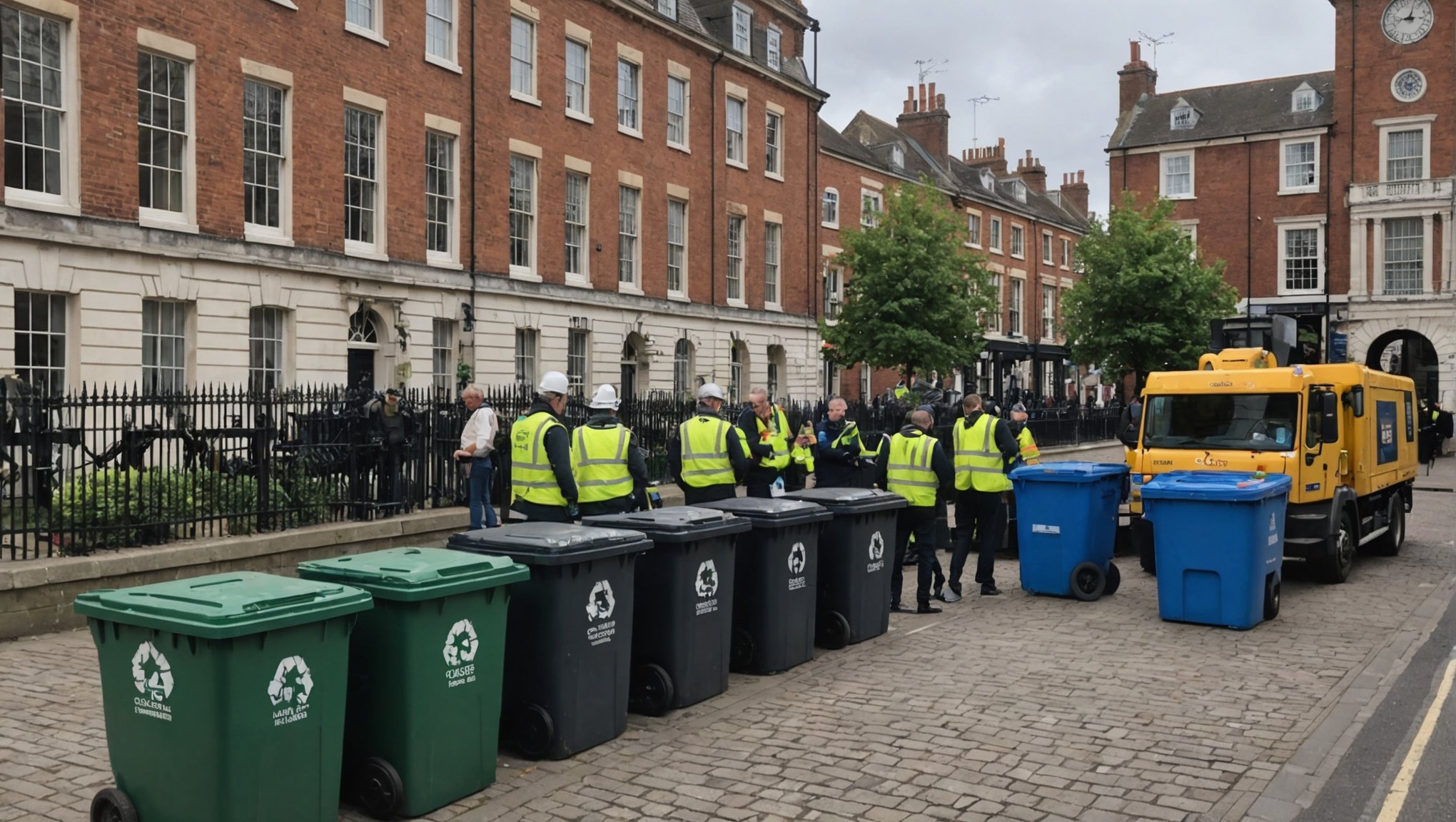As urban populations expand, managing waste becomes increasingly challenging. UK cities are turning to the Internet of Things (IoT) to revolutionise waste management. Smart bins equipped with sensors track waste levels in real time, optimising collection routes and reducing operational costs. This technology not only enhances efficiency but also improves sustainability efforts. Discover how these innovative solutions are setting a precedent for smarter cities while addressing the crucial issue of waste management.
Overview of Smart Waste Solutions
In the evolving landscape of urban waste management, smart waste solutions are pivotal. These solutions leverage cutting-edge technologies to enhance efficiency and sustainability. At the heart of this transformation is the Internet of Things (IoT), which plays a crucial role in modernising waste management practices.
Also to read : Transforming Waste Management in the UK: The Impact of Machine Learning Innovations
Smart waste solutions integrate IoT technology to revolutionise how waste is collected, processed, and disposed of. IoT devices, such as sensors and smart bins, are deployed to monitor waste levels in real-time. This data-driven approach allows waste management companies to optimise collection routes, reducing fuel consumption and emissions. By predicting when bins will be full, resources are allocated more efficiently, minimising unnecessary trips and lowering operational costs.
The significance of these innovative strategies extends beyond logistical improvements. As urban populations grow, traditional waste management methods struggle to cope with increasing waste volumes. Smart waste solutions offer a sustainable alternative, reducing environmental impact and improving urban living conditions.
Also to discover : Transforming Customer Experience in UK Telecom: The Role of AI Innovation
By embracing IoT in waste management, cities can enhance their waste management systems, making them more responsive and adaptive to changing needs. This not only addresses current waste management challenges but also paves the way for a more sustainable future.
Case Studies of UK Cities Implementing Smart Waste Solutions
Exploring how UK cities are embracing smart waste management provides valuable insights into the practical applications of these technologies. Each city has its unique approach, showcasing the versatility of smart waste solutions.
London: Implementation of Smart Bins and Data Analytics
London stands at the forefront with its deployment of smart bins. These bins are equipped with sensors that monitor waste levels and communicate this data to a central system. This information is then analysed to optimise waste collection schedules. The result is a significant reduction in unnecessary collections, leading to decreased fuel consumption and lower carbon emissions.
Bristol: Real-Time Monitoring and Its Impact on Waste Collection
In Bristol, real-time monitoring plays a crucial role. Equipped with advanced IoT devices, the city can track waste levels across various locations. This capability allows for dynamic route adjustments, ensuring that collection vehicles only visit areas where bins are nearing capacity. This approach not only improves efficiency but also enhances the city's ability to manage waste effectively.
Manchester: Integration of IoT Solutions for Recycling and Waste Reduction
Manchester has integrated IoT solutions to bolster its recycling efforts. By using smart sensors, the city can differentiate between recyclable and non-recyclable materials. This data-driven strategy aids in reducing overall waste and promotes sustainable practices.
Benefits of IoT in Waste Management
IoT technology is transforming waste management by significantly boosting waste management efficiency. One of the most notable benefits is the enhancement of waste collection processes. By utilising real-time data from IoT devices, waste management companies can optimise collection routes, ensuring that vehicles only visit areas where waste levels are high. This targeted approach not only saves time but also reduces fuel consumption, directly impacting carbon emissions.
Moreover, the integration of IoT leads to substantial cost savings for municipalities. With more efficient route planning and resource allocation, cities can decrease the frequency of waste collections, thereby cutting down on operational costs. This efficiency allows for better budget management, enabling municipalities to allocate funds to other essential services.
Environmental benefits are also significant. The reduction in carbon footprint due to fewer collection trips contributes to cleaner air quality. Additionally, IoT-driven insights help in reducing landfill use by promoting better recycling practices. By identifying waste types and volumes more accurately, cities can implement more effective recycling strategies, ultimately leading to a more sustainable urban environment.
In essence, the benefits of IoT in waste management extend beyond operational efficiency, offering economic and environmental advantages that are crucial for modern cities.
Statistics on Efficiency Improvements
The integration of IoT efficiency in waste management has led to remarkable transformations, evidenced by compelling waste management statistics. Key performance indicators (KPIs) have shown significant improvements post-IoT implementation. For instance, cities adopting IoT technology have reported up to a 30% reduction in waste collection times, demonstrating the system's ability to streamline operations effectively.
Comparative analysis of waste collection routes before and after IoT implementation reveals enhanced efficiency. Pre-IoT, routes often involved unnecessary trips, leading to increased fuel consumption. However, with IoT, data-driven route optimisation ensures vehicles only visit areas with high waste levels. This not only reduces travel time but also cuts fuel usage by approximately 20%.
Moreover, the impact on recycling rates is notable. IoT systems facilitate better sorting and identification of recyclable materials, resulting in a 15% increase in recycling rates. This improvement contributes to higher waste diversion from landfills, supporting environmental sustainability goals.
These statistics underscore the transformative power of IoT in waste management, highlighting its role in achieving operational efficiency, economic savings, and environmental benefits. By leveraging IoT efficiency, cities can enhance their waste management systems, making them more responsive and sustainable.
User Benefits of Smart Waste Solutions
Smart waste management offers numerous advantages to residents, enhancing their daily lives through increased convenience and engagement. One of the primary benefits is the accessibility of smart bins. These bins are strategically placed and equipped with sensors, allowing residents to easily locate the nearest available bin for disposal. This accessibility reduces the time and effort needed to manage household waste, making waste disposal a seamless experience.
Residents also enjoy the perk of real-time updates and notifications regarding waste collection schedules. These notifications inform users when bins are nearing capacity or when collection is due, allowing them to plan their waste disposal activities more effectively. This system not only improves the efficiency of waste management but also ensures that residents are never caught off guard by unexpected collection days.
Moreover, smart waste solutions foster community engagement and awareness through data sharing. By providing insights into waste generation patterns and recycling rates, communities can better understand their environmental impact. This transparency encourages residents to participate actively in waste reduction initiatives, promoting a culture of sustainability.
In essence, the integration of smart waste solutions not only simplifies waste management for users but also empowers them to contribute to a cleaner, more sustainable environment.
Potential Challenges in Implementing Smart Waste Solutions
Implementing smart waste solutions presents several challenges, particularly in terms of IoT implementation. A significant hurdle is the technical challenges and infrastructure requirements necessary for deploying IoT devices. Cities must ensure robust connectivity and power supply for sensors and smart bins, which can be complex and costly.
Data privacy concerns also loom large. With IoT devices collecting vast amounts of data, managing user information securely is crucial. Cities need to develop stringent data privacy policies to protect residents' information, ensuring that data is used responsibly and transparently.
Budget constraints pose another challenge for local governments. The initial investment in IoT infrastructure can be substantial, and ongoing maintenance and upgrades add to the financial burden. This necessitates careful financial planning and prioritisation to ensure that smart waste solutions are sustainable in the long term.
Local governments must balance these financial considerations with the potential benefits of smart waste management. While the upfront costs can be daunting, the long-term savings and environmental benefits often justify the investment. Addressing these challenges requires a strategic approach, involving collaboration between technology providers, policymakers, and the community to create effective and sustainable solutions.
Future Trends in Smart Waste Management
As cities strive for more efficient waste management, the future of waste management is set to be shaped by emerging technologies and increased citizen participation. Predictions suggest that the evolution of IoT will continue to play a pivotal role. With advancements in sensor technology and connectivity, IoT devices are expected to become even more sophisticated, offering enhanced data accuracy and real-time monitoring capabilities.
The integration of artificial intelligence (AI) into smart waste management systems promises to revolutionise the sector. AI can analyse vast datasets to predict waste generation patterns, allowing for more precise planning and resource allocation. This could lead to the development of autonomous waste collection vehicles that dynamically adjust their routes based on real-time data, further optimising efficiency.
Citizen participation will also be crucial in shaping future strategies. Engaging communities through educational initiatives and collaborative platforms can foster a culture of sustainability. By involving residents in decision-making processes and encouraging active participation, cities can develop more tailored and effective waste management solutions.
In summary, the future of waste management will likely see a blend of advanced technologies and community collaboration, ensuring smarter, more sustainable urban environments. As these trends unfold, cities will be better equipped to tackle the challenges of growing waste volumes.
Expert Insights and Opinions on Smart Waste Solutions
In the realm of waste management innovations, expert insights are invaluable. Professionals and city officials alike share their experiences and predictions, shedding light on the evolving landscape of smart waste solutions. Interviews with these experts reveal a consensus on the importance of integrating technology with traditional waste management practices. They highlight that while IoT and AI are revolutionising the industry, the human element remains crucial for successful implementation.
A key point raised by professionals is the need for continued research and development. As smart waste technologies advance, staying ahead of the curve is essential. This involves not only developing new technologies but also refining existing ones to enhance efficiency and sustainability. Experts predict that future innovations will focus on improving data accuracy and expanding the capabilities of IoT devices.
City officials emphasise the significance of collaboration between municipalities and technology providers. This partnership is vital for addressing challenges such as budget constraints and data privacy concerns. By working together, cities can effectively implement smart waste solutions, ensuring they meet the unique needs of their communities.
In summary, expert opinions underscore the transformative potential of waste management innovations. As technology and human expertise converge, the future of waste management looks promising and sustainable.











